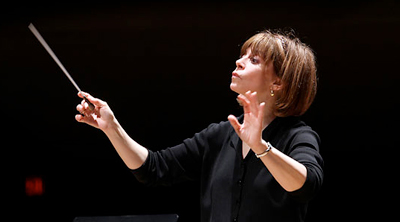by Mike Telin

“It’s been a long time since I last conducted in Akron, and I’m delighted to be coming back,” the engaging, Grammy-award-winning conductor said via telephone. “Christopher Wilkins and I have known each other for a long time. We’re really good friends, and I’m happy he invited me.”
Falletta, who serves as the Music Director of the Buffalo Philharmonic Orchestra and the Virginia Symphony Orchestra, will open Saturday’s concert with the second suite from Albert Roussel’s Bacchus and Ariadne. “I find it to be an unjustly neglected work,” Falletta said, adding that she makes a keen effort to seek out overlooked gems of the repertoire. “I’ve recorded a lot of pieces for Naxos that are not very well known, or are by composers who seem to have fallen into oblivion.”
The suite is taken from Roussel’s ballet score, which is based on characters from Greek mythology. “It’s filled with color and is beautifully orchestrated in the way that many early twentieth-century French composers wrote — like a giant paint box of colors that they would mix together. It’s truly stunning music and ends in a wild dance of celebration, a little bit like Daphnis and Chloé. I hope the musicians and the audience enjoy it.”
The concert will continue with a work written for Benny Goodman: Aaron Copland’s Clarinet Concerto, featuring Milwaukee Symphony principal clarinet Todd Levy as soloist. “I’ve worked with Todd many times. He’s an old friend and a lovely person — we were in school together, and I’m an enormous fan. I love his playing, and it’s always nice to have an American piece on a program.”
The second half of the concert will be devoted solely to Johannes Brahms’s Symphony No. 2. “All four of his symphonies are fantastic so it’s hard to choose a favorite,” Falletta said. “But there’s something about the second that is so warmhearted. It has a feel-good spirit, and the blazing ending is fabulous. It’s complicated and wonderful music that is also immediately accessible — which is not always true about pieces where the fabric is so tightly woven and so complex. But this piece just reaches out and draws listeners into its beauty.”
Since being appointed to her position in Buffalo in 1999, JoAnn Falletta has spearheaded efforts to make the BPO part of the fabric of the community. She was named Buffalo’s Most Influential Civic Leader, Buffalo and Erie County’s Artist of the Year, and presented with the Chancellor Charles P. Norton Medal, the University of Buffalo’s highest award. She also received the Foundation for Jewish Philanthropies Award for outstanding leadership in the Marcel Tyberg Musical Legacy project.
“I think people want to feel that their orchestra is a part of their lives, and the stage is not just a place where musicians come and play and have no connection to the audience. We’re a very egalitarian society in the U.S. and I think that’s part of it — people want to be able to talk to the musicians and the conductor and make suggestions, and I enjoy those conversations.”
Falletta believes that the role of an orchestra’s music director should be far-reaching into the community. “Music directors really do become ambassadors for music in the region, and I take that very seriously, as does Christopher Wilkins. We’re helping to open the door to classical music for so many people and to make our concert hall and concerts a welcoming place where they can learn, be inspired, and have fun. But to do that, you have to know your community. One of the most wonderful things about being a music director is that you get to know people all around you and find out what’s important to them and what they like.”
Learning to engage with one’s community takes time, and Falletta pointed out that learning how to immerse yourself in a community is not something that is taught at music school. Because of that, the BPO has established a unique collaboration with Mannes School of Music that gives up-and-coming conductors professional experience. “The students shadow everything from rehearsals to meetings. They really get to know hands-on how orchestras work.”
Another way Falletta engages with people is through her touching and insightful writing. Making her essays and poetry public came at the suggestion of a friend. “Writing has always been important to me. I like to write program notes and project descriptions for grant applications. But my poetry is like a diary so I can remember certain performances, people, pieces, and moments in life that struck me in a forceful way. My friend convinced me that I should let people read them. He said that it might open the door to a better understanding of what’s happening onstage, or to shine some light on the mysteries of making music. We want people to understand how we feel and how important it is for us to make music for them.”
A BPO program initiative that has been successful in bringing people from all walks of life into the concert hall is the biannual JoAnn Falletta International Guitar Concerto Competition. “We started this a dozen years ago with the radio station WNED. The station president, Don Boswell, is a great guitar fan. He knew that I was a guitarist, and together we came up with the plan. While there are many guitar competitions, there aren’t many for guitar and orchestra. We have ten semifinalists from all over the world come and play a solo recital, and then three finalists play with the orchestra. It’s always a great event for us, and people who are not really classical music lovers come. They’re just intrigued by the guitar. For people who like folk music, jazz, and pop, the guitar seems to cross all lines. And that’s very exciting for us.”
Published on ClevelandClassical.com November 10, 2015.
Click here for a printable copy of this article


